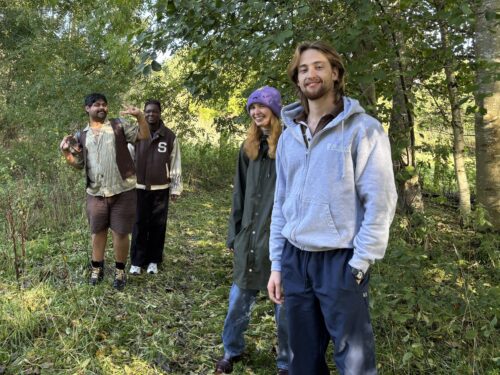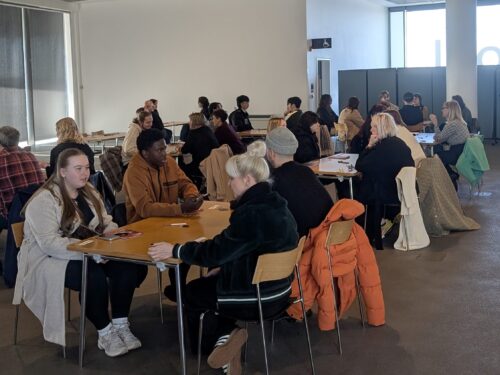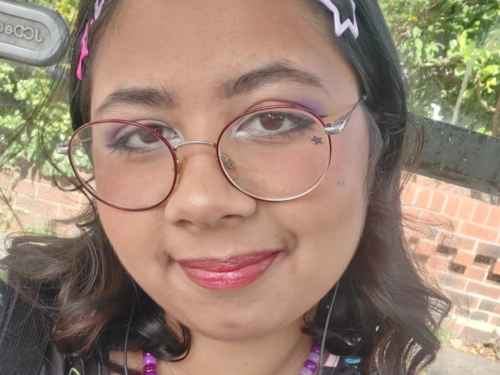How does mentoring work?
You will be matched with an industry professional who shares your interests.
You will have monthly meetings with your mentor in a public space or online. You, your mentor and the Arts Emergency team can decide the safest option for you, where you feel most comfortable.
Together you will focus on your goals and what you want to achieve.
Your mentor will help by offering advice and guidance on education and careers as well as helping you to build your confidence and connections.
Who can apply?
If you are aged between 16 and 18 and live in London, Greater Manchester, or Merseyside you can apply! We try to work with young people who most need the support of an Arts Emergency mentor the most, and therefore mentees should meet at least one of the criteria below:
Your parents or carers didn’t attend university in the UK or abroad
The main household earner when you were 14 had a ‘working class’ occupation (i.e. a technical or craft occupation; a routine, manual, or service occupation; or was long-term unemployed)
You have been eligible for free school meals
You are receiving the government's 16-19 bursary
You consider yourself as being from an ethnic minority background
You consider yourself to be disabled*
You consider yourself to have a learning disability or special education need*
*Under the Equality Act 2010, you are 'disabled' or 'learning disabled' if you have a physical or mental impairment that has a substantial and long-term negative effect on your ability to do normal daily activities.
If you are not sure about your eligibility for the mentoring programme and would like to talk to a member of the team please contact us by emailing mentoring@arts-emergency.org.
How do I apply?
Visit our Get a Mentor page and fill out the application form at the bottom of the page.
If you find it difficult to communicate through writing, for example if you have dyslexia, you can also complete your application over the phone. Email mentoring@arts-emergency.org to schedule this.
Who are Arts Emergency mentors?
Arts Emergency mentors are a team of volunteers from a variety of professional backgrounds. They've all signed up because they are connected, kind and want to help you get ahead! They are trained in goal-setting, working with young people and understanding safety procedures. Our mentors come from a range of established organisations including the V&A, Netflix, New York Times, Manchester International Festival, BBC, Tate Liverpool, Universal Records, FACT, Royal Exchange Theatre, HOME, Contact Theatre, National Museums Liverpool, Craft Council and more!
What areas do Arts Emergency mentors specialise in?
Architecture - Digital & Graphic Design - Fashion, Textiles & Costume - Fine Art - Interior Design - Product Design - Photography - Acting & Theatre - Dance - Music - Animation - Coding & Games - Factual TV - Film & TV Drama - Broadcast Journalism - Radio & Podcasting - Academia & Education - Classics - English Literature or Language - Fiction Writing - History - Non-Fiction Writing (Inc Print Journalism) - Politics & Activism - Poetry - Screenwriting - Archiving & Libraries - Arts Administration - Community & Engagement Projects - Event & Venue Management/ Production - Marketing, PR & Branding - Museums, Galleries & Heritage - Publishing … and more!
If you are unsure whether your interest falls under the arts or humanities, you can always email us at mentoring@arts-emergency.org.
How do you keep young people safe?
Mentors are trained by our team to work with young people and keep them safe
Every mentor is required to sign our code of conduct and complete an enhanced criminal record check
Every mentor is interviewed before meeting their mentee.
Arts Emergency will conduct reference checks for all mentors.
The Arts Emergency team checks in regularly with young people and volunteers.
Mentors must send in reports after every session.
What happens after mentoring?
After your year of mentoring, mentees remain part of the Young Community where they can continue to access support and opportunities like networking events and development opportunities until their 26th birthday. You can read about how this has helped people like Kristian in the 'Our Stories' section of our website.

Our Stories
"I’d thought about studying architecture at university but I had no idea about the route to get there."
Louis, 22, from Manchester, first joined Arts Emergency as a mentee in 2020. Four years later, he's now a member of the Youth Collective and is well on his way to becoming an architect.

Our Stories
"our mentoring sessions were always productive and encouraging"
Ruben, aged 18, is an aspiring filmmaker based in Merseyside. He was looking for a mentor who could help him understand routes into the film industry and expand his professional network.

Our Stories
"I wanted to go to university and do something creative and literary but I wasn’t sure what that would look like long term"
Laaibah, aged 18 from Manchester, was looking for a mentor who could share insights about creative writing and script writing.